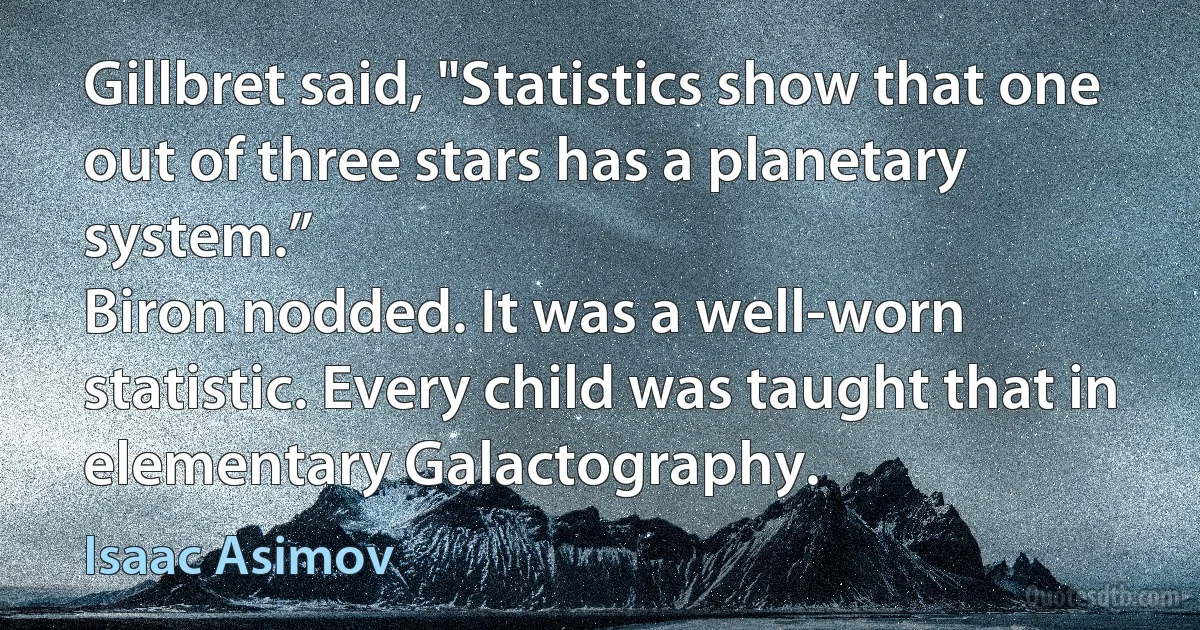Elementary Quotes - page 13
In the philosophy of Democritus the atoms are eternal and indestructible units of matter, they can never be transformed into each other. With regard to this question modern physics takes a definite stand against the materialism of Democritus and for Plato and the Pythagoreans. The elementary particles are certainly not eternal and indestructible units of matter, they can actually be transformed into each other. As a matter of fact, if two such particles, moving through space with a very high kinetic energy, collide, then many new elementary particles may be created from the available energy and the old particles may have disappeared in the collision. Such events have been frequently observed and offer the best proof that all particles are made of the same substance: energy.

Werner Heisenberg
The equation of motion holds at all times, it is in this sense eternal, whereas the geometrical forms, like the orbits, are changing. Therefore, the mathematical forms that represent the elementary particles will be solutions of some eternal law of motion for matter. Actually this is a problem which has not yet been solved.

Werner Heisenberg
I hadn't been there in a very long time, because everyone who's ever lived there who has been lucky enough to get out knows that you don't go back. And I did go back, and I wanted to get a look at our house. I went back to my old elementary school, and I walked around and then, while I was there, a boy - this is very emotional, but a boy on a bike came up to my car and told me to leave. Basically approached me and said I didn't belong there. And I told him I used to live there, I grew up there and that I know my way around. And he was like "No, you have to leave. You don't belong here." But the truth is that I don't. As much as I love El Caserío and as much as it feels like home, it's not my place anymore.

Jaquira Díaz
Kandinsky's teaching: scientifically rigorous examination of colour and form. Example: seek the corresponding elementary colour for the three forms (triangle, square and circle). It was decided that they are yellow for the triangle, blue for the circle and red for the square; so to say, once and for all.

Wassily Kandinsky
Everything which the ego is able to unfold within itself must give birth to love. The all-embracing archetype of love is set forth in the revelation of... the Christ Mystery. Through Him the germ of love is planted in the innermost core of the human being; and from this starting-point it must flow through the whole of evolution. Just as the wisdom previously formed manifests in the forces of the earthly sense-world, in the "elementary forces” of to-day, so love itself will manifest in the future, in all phenomena, as the new "elementary force.”.

Rudolf Steiner
More than one pathologist, chemist, homeopathist, and magnetist has quenched his thirst for knowledge in the books of Paracelsus. Frederick Hufeland got his theoretical doctrines on infection from this mediaeval "quack,” as Sprengel delights in calling one who was immeasurably higher than himself. Hemman, who endeavors to vindicate this great philosopher, and nobly tries to redress his slandered memory, speaks of him as the "greatest chemist of his time." So do Professor Molitor, J and Dr. Ennernoser, the eminent German psychologist. According to their criticisms on the labors of this Hermetist, Paracelsus is the most wondrous intellect of his age,” a " noble genius.” But our modern lights assume to know better, and the ideas of the Rosicrucians about the elementary spirits, the goblins and the elves, have sunk into the "limbo of magic” and fairy tales for early childhood.

Paracelsus
A law explains a set of observations; a theory explains a set of laws. The quintessential illustration of this jump in level is the way in which Newton's theory of mechanics explained Kepler's law of planetary motion. Basically, a law applies to observed phenomena in one domain (e.g., planetary bodies and their movements), while a theory is intended to unify phenomena in many domains. Thus, Newton's theory of mechanics explained not only Kepler's laws, but also Galileo's findings about the motion of balls rolling down an inclined plane, as well as the pattern of oceanic tides. Unlike laws, theories often postulate unobservable objects as part of their explanatory mechanism. So, for instance, Freud's theory of mind relies upon the unobservable ego, superego, and id, and in modern physics we have theories of elementary particles that postulate various types of quarks, all of which have yet to be observed.

Johannes Kepler
The supreme task of the physicist is to arrive at those universal elementary laws from which the cosmos can be built up by pure deduction. There is no logical path to these laws; only intuition, resting on sympathetic understanding of experience, can reach them. In this methodological uncertainty, one might suppose that there were any number of possible systems of theoretical physics all equally well justified; and this opinion is no doubt correct, theoretically. But the development of physics has shown that at any given moment, out of all conceivable constructions, a single one has always proved itself decidedly superior to all the rest.

Albert Einstein


